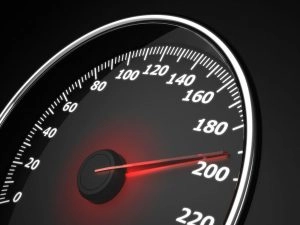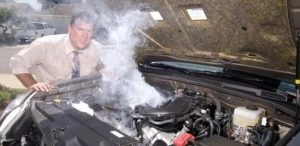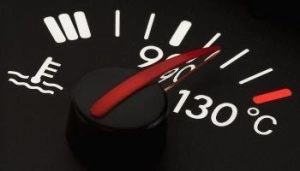Many car owners face the problem of the car overheating, a problem which could lead to the car breaking down and causing significant losses. This problem is known as an overworked engine, which is a situation that occurs when the engine's temperature rises above its normal level.
The rise in engine temperature depends on several different factors such as driving style, engine oil quality, and cooling system. In this article, we will discuss the reasons for the rise in car temperature and how to deal with them.

What should you do when the car's temperature rises?
If you're on the road and the warning lights on your dashboard alert you to an increased vehicle temperature, and you notice a strange smell coming from your car's engine or see smoke, or feel the car is not running as it should, follow these precautions to maintain your car engine's safety.
Turn off the air conditioning and open the windows.
If the engine temperature is too high, turning off the air conditioner may help lower the temperature for a short while. However, you must be careful when turning off the air conditioner as it can increase the humidity inside the car, making it uncomfortable.
Therefore, open all the windows to release as much heat as possible from the car.
Stop and assess the situation.
If you notice thatYour car's temperatureIf it suddenly increases, you should leave the road for a safe and clear area and turn off the car.
You should be aware that operating the car when the engine temperature indicates that it is too high, is a significant risk to the engine and could potentially cause permanent damage to the car.
Turn on the radiator.
After taking the step of stopping the car in a safe area, proceed to the second step which is turning on the radiator. The engine may need to cool down for up to 30 minutes before resuming work again.
But if the temperature is moderate, you can run the cooler at maximum speed for about 10 minutes, and then open the front cover to allow cool air to enter the pipes.
Check the coolant fluid level.
In the event of your car's radiator not working, you should check the coolant level, as it is an important step when the car's temperature rises.
Coolant is an essential part of the engine's cooling system, helping to regulate its temperature and protect it from both excessive heat and corrosion. When the coolant level drops below the required level, it can lead to an increase in engine temperature, potentially causing engine damage or failure.
Therefore, you should regularly check the coolant level, especially when the car temperature rises or when traveling long distances.
You can check the coolant level by opening the radiator tank cap, and making sure that the fluid level exceeds the minimum limit specified on the tank. If the fluid level is low, you should add an adequate amount of the appropriate coolant until the level reaches the required limit.

Check the oil level.
Check theThe oil level in the engineIt is an important step to maintain the health of the engine and ensure its longer lifespan. When the engine temperature rises, the oil is exposed to high temperatures and deteriorates faster. Therefore, it is important to regularly check the oil level, especially when the car temperature rises.
It is necessary to ensure that the oil level is always within the range specified in the owner's manual. If there is a need to add oil, the appropriate type for the vehicle should be used. Additionally, it is important to make sure that the oil is clean and free from impurities and sediment. Regular oil changes can be made according to the recommendations of the manufacturer.
If the oil level is very low, this indicates a leak in the system, which should be repaired as soon as possible to prevent engine damage. Therefore, it is important to regularly check the oil level and ensure that the system is working properly, in order to maintain the health of the engine and avoid breakdowns and high costs in the future.
Also read:Car Overheating: Causes and Prevention Methods
What Not to Do When the Car Overheats
Do not continue driving.
Continuing to drive the car when the engine temperature is high is not appropriate, as a significant increase in the car's temperature indicates a potential problem in the system. Immediate action should be taken to avoid engine damage.

Do not open the radiator cap before the engine cools down.
It is not appropriate to open the radiator cap when the car's temperature is high as it can cause accidents and serious injuries. You should wait until the engine has cooled down completely before opening the radiator cap.
Even when the engine is cold, caution should be exercised. Wear gloves and glasses, and use a towel to slowly open the cover, as opening the radiator cap may require some force.
It should be noted that opening the radiator cap when the engine is hot can lead to the leakage of hot fluid and steam, causing serious burns.
So, if there is a need to addCoolant FluidYou should wait until the engine has completely cooled down, then gradually add the fluid after slowly opening the cap.

Comments